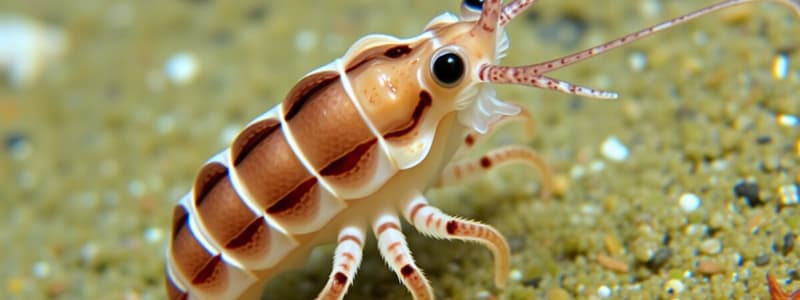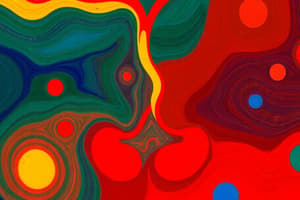Podcast
Questions and Answers
How do marine invertebrates cope with the high solute concentration of seawater?
How do marine invertebrates cope with the high solute concentration of seawater?
- They absorb seawater to maintain fluid balance
- They match the tonicity of seawater by increasing blood urea concentration (correct)
- They must drink seawater to survive
- They actively excrete urea to dilute their blood
What is the primary function of osmoregulation in animals?
What is the primary function of osmoregulation in animals?
- To regulate body temperature through fluid balance
- To remove nitrogenous wastes from the body
- To control the movement of solutes between internal fluids and the external environment (correct)
- To balance the uptake and loss of oxygen
What adaptation do freshwater vertebrates have for handling water influx?
What adaptation do freshwater vertebrates have for handling water influx?
- They reabsorb important ions via active transport in their kidneys (correct)
- They increase their salt intake from the environment
- They rapidly excrete all excess water through their gills
- They produce large amounts of urine with minimal ion loss
What waste product do insects primarily produce as an adaptation to terrestrial life?
What waste product do insects primarily produce as an adaptation to terrestrial life?
What is the role of Malpighian tubules in terrestrial insects?
What is the role of Malpighian tubules in terrestrial insects?
Which of the following statements about marine vertebrates is true?
Which of the following statements about marine vertebrates is true?
What feature distinguishes nephridia in earthworms?
What feature distinguishes nephridia in earthworms?
What is the primary aspect of excretion in animals?
What is the primary aspect of excretion in animals?
Flashcards are hidden until you start studying
Study Notes
Osmoregulation
- Controlled movement of solutes between internal fluids and external environments.
- Balances the uptake and loss of water and solutes.
Excretion
- Eliminates nitrogenous metabolites and other waste products.
Fluid Regulation in Animals
Marine Invertebrates
- Environment has a higher solute concentration than the body, making seawater potentially toxic.
- Higher blood urea concentration matches seawater tonicity, enabling survival.
Marine Vertebrates
- Body fluids are less concentrated than seawater.
- Must reabsorb water to maintain health.
- Excrete ions like sodium and chloride minimally to conserve internal water.
Freshwater Vertebrates
- Body is hypertonic compared to the surrounding environment, promoting water influx.
- Kidneys manage water uptake and allow significant NaCl loss.
- Reabsorb essential ions through active transport.
Terrestrial Animals
- Body fluids regulated by specialized excretory systems.
Malpighian Tubules in Insects
- Remove nitrogenous wastes from hemolymph while functioning in osmoregulation.
- Produce dry waste matter (primarily uric acid), an adaptation for terrestrial living.
- Some insects can absorb water from air to aid in hydration.
Nephridia in Earthworms
- Nephridia consist of a dilated opening (nephridiostome) leading to a coiled tubule surrounded by capillaries.
- Waste moves through tubules and is excreted via nephridiopore.
Studying That Suits You
Use AI to generate personalized quizzes and flashcards to suit your learning preferences.



